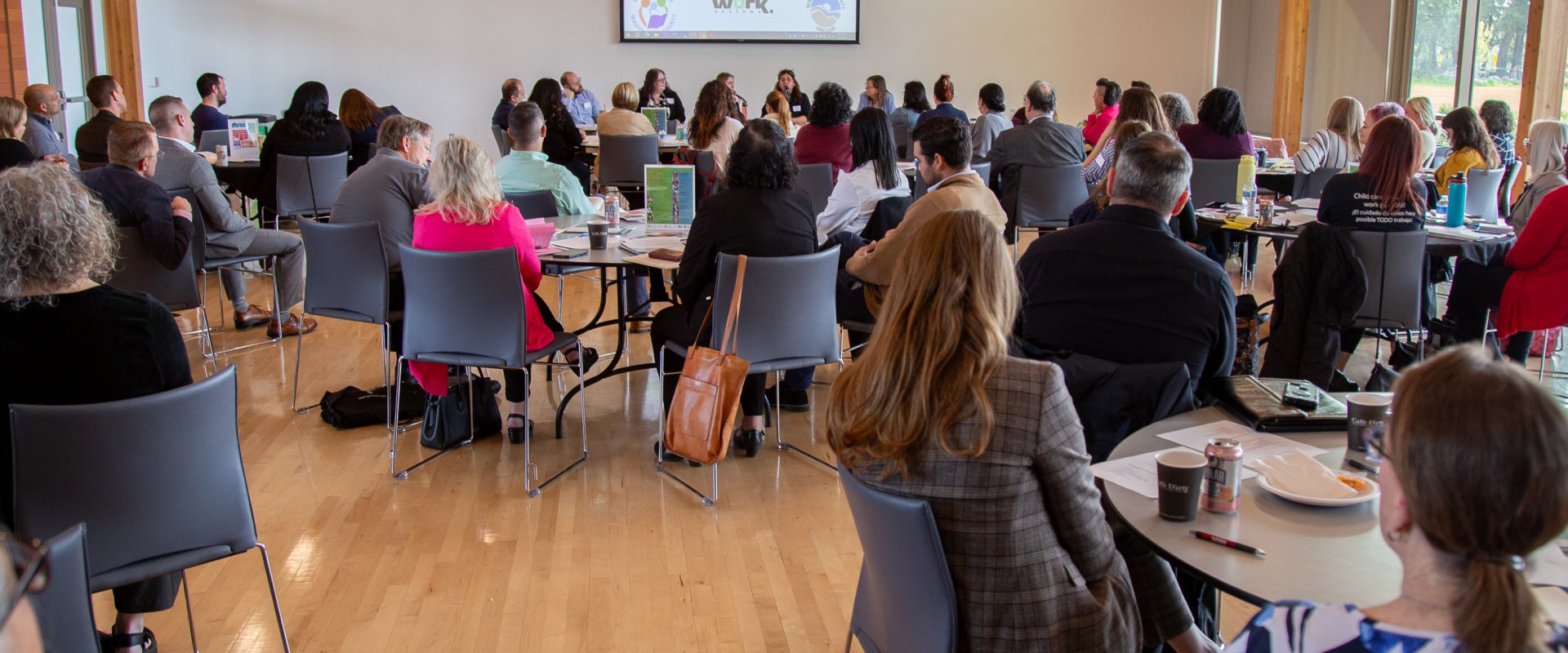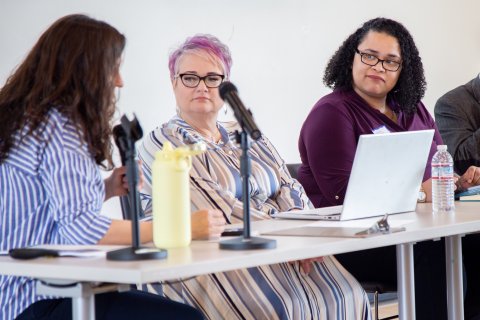Wednesday, Apr. 24, 2024
Washington County recently hosted a pivotal event that sought to unite voices from diverse sectors to confront a new, pressing challenge: childcare in the wake of industry growth due to the CHIPS Act. The Washington County Childcare Summit brought together passionate advocates, industry leaders and policymakers to dissect the intricate web of issues surrounding childcare accessibility, affordability and quality. As the curtains rose on this event, it became evident that the discourse extended far beyond the realm of early learning — the determination and excitement in the room carried the best intentions for families, businesses and children in Washington County.
The CHIPS Act necessitates companies receiving funding of more than $150 million take care to provide high-quality childcare for their employees and construction workers building any semiconductor facilities this funding may facilitate. However, it does not require these companies consider the landscape of childcare accessibility in areas they are expanding in, areas such as Washington County which struggles to provide affordable childcare to their community already. Intel’s expansion alone, which is possible because of federal and state funding from the CHIPS Act, will bring thousands of new families to Washington County. With that comes stresses on the childcare landscape, and our Early Learning Washington County team and their myriad partners want to help guide how funding is directed. They want to ensure that the most vulnerable aren’t left behind as the county is flooded with new families in search of childcare. And they want semiconductor companies involved, because they know it’s going to be best for both the families they support and the industry seeking growth.
Childcare is a business issue. Those who work in childcare are the workforce behind the workforce. Through investment there are opportunities to tackle these challenges and together we need to work to mitigate negative impacts to marginalized communities.
“Childcare is a business issue. Those who work in childcare are the workforce behind the workforce. Through investment there are opportunities to tackle these challenges and together we need to work to mitigate negative impacts to marginalized communities,” said Jessica Rosengreen, Program Manager at Child Care Resources & Referral of Washington County.
The first panel of the Washington County Childcare Summit peeled back the layers of the childcare conundrum here, revealing stark realities of families lacking access to childcare and poignant narratives of successful endeavors. According to an infrastructure analysis conducted by Early Learning Washington County, there are 39,000 (and growing) children and 23,000 early learning slots in the county. Washington County is one of the most expensive counties for childcare (according to the 2022 Oregon Market Price Survey). A mind-bending statistic shared by one panelist assessed that childcare costs for families in Washington County were higher, almost double, than both of Oregon’s public university tuition costs per year.
One crucial insight that childcare experts possess, which the industry might overlook, is that capacity and enrollment will never perfectly align.
“Saying you have 3,000 slots and there are 3,000 kids doesn’t mean it’s adequate,” said Evan Weaver, Early Learning Washington County co-director. He compared the conundrum to having 0% unemployment. “There’s nuance to understand.”
Additionally, considerations discussed at the Summit’s first panel included how, despite being expensive for families, childcare providers are still severely underpaid. The U.S. Department of Health and Human Services considers childcare to be affordable if it is no more than 7% of a family’s income. In Washington County, if you are making minimum wage, average childcare expenses would take up 67% of your income. Despite this, almost 1 out of 3 early educators live in poverty. The top reason early educators cite when leaving the industry is the need for better wages and benefits.
Washington County is the most diverse county in Oregon. That means childcare must reflect that diversity for the best outcomes. Culturally sensitive and responsive childcare is a necessity here, and industry leaders in search of an easy solution to their requirement to provide childcare for their employees may not have that cultural lens, and may not implement solutions that create an equitable environment for the county. Industry representatives do well to bring experts in culturally sensitive childcare such as Laura Paz to the table when implementing their solutions.
In order to succeed in childcare, to continue to grow, providers have to do everything. They have to be a chef, a business owner, a caretaker. It’s impossible. If we try to tackle this problem individually, we will never make it happen.
Paz opened up Casita Azul several years ago and has since grown it from one childcare provider to 10. Her philosophy and culture guides her business decisions, and despite the early learning industry having incredibly high turnover rates, she has been able to maintain the majority of her employees over the years. Her community grows with her, hiring the abuelas of the children in her program to cook for classes, hiring sisters and brothers of other educators to make work more comfortable and collaborative for everyone. These kinds of business strategies are not ones you’ll find in the boardrooms of industry executives deciding how to implement their required childcare funding. All can benefit if those boardrooms reach out to the community they’ll be making decisions in.
One of the semiconductor industry representatives present was Kathy Bishop of Jireh Semiconductor. She recognized that, from an industry perspective, they are not usually in a room like the one filled with early educators and advocates at the Washington County Childcare Summit. Bishop discussed how important innovation and collaboration is in this space, and how business can garner incredible benefits from offering a well thought out childcare benefit to employees and potential hires. Offering childcare benefits for people who work diverse schedules is important for many in the semiconductor industry as well.
As an industry, we are always wanting our engineers to be innovative, working on the next big thing. So as a person challenged with this issue from an HR perspective, I want to innovate as well.
“A lot of companies may be thinking they’ll just hand out vouchers and say, ‘Done,’” Bishop said. “As an industry, we are always wanting our engineers to be innovative, working on the next big thing. So as a person challenged with this issue from an HR perspective, I want to innovate as well.”
The panelists and attendees have an array of asks for industry, knowing they can help the rollout of these CHIPS funds to be done in an equitable and efficient way. They want industry to leverage Early Learning Washington County hub and Child Care Resources & Referral of Washington County to ensure business won’t implement things in a way that will be detrimental to an already fragile childcare ecosystem. They want to be brought to the decision-making table to help all parties thrive. And they want to ensure that businesses that can just afford to hand out vouchers for preschool and other early learning options don’t just hand out vouchers and crowd out low-income and working-class families.
“I feel like a tsunami is coming, and everyone in this room acknowledges a tsunami is coming,” one attendee said. “What tools do we have to mitigate the damage?”
This will be a continued project from our Early Learning Washington County team and their partners, as the reality of this growth in demand is better understood. They hope to create a coalition of voices that can help guide this tsunami to, hopefully, do a little good for the county at large.



